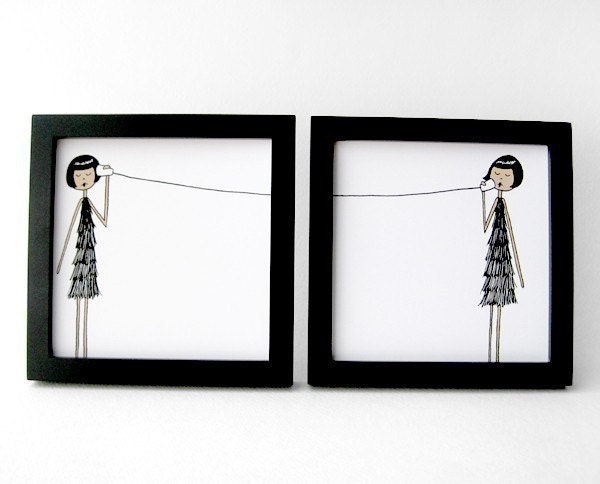Every Wednesday our 8th graders have what's called "Self-Directed Learner" Day where the kids rotate in one hour blocks and do supplementary activities that are related to what they are working on in their core classes. I taught my first series of these last month.
Since the kids are gearing up for a giant research project due in April, I wanted to do something related to that. One component of the project requires them to interview a mentor or someone in the community who is an expert in the field they have chosen for their topic. I thought of the "StoryCorps" interviews broadcasted every Friday on NPR and did some research to find out if this could be developed into a lesson plan. If you haven't heard these interviews before, visit NPR's website or the StoryCorps site, where you can listen to truly great interviews of ordinary and extraordinary Americans.
Sure enough, right on the StoryCorps website, there are free, downloadable lesson plans. They even come complete with suggestions of which interviews to play and an awesome "Great Questions" list to help the interviews along.
I ended up have the kids listen to 3 or 4 interviews (about 3 minutes each) then had a brief discussion about oral traditions, the purpose of the interviews, and what makes a good interview. Then they broke off into pairs and came up with a minimum of 10 interview questions to ask their partner. I borrowed some Ipod Nanos from our computer lab so the kids could record their interviews. The next week, when we reconvened, the kids got a chance to listen to some of their friend's interviews, which they loved, and finished up recording their own.
from our computer lab so the kids could record their interviews. The next week, when we reconvened, the kids got a chance to listen to some of their friend's interviews, which they loved, and finished up recording their own.
All in all, it was a fun experience, however there were definitely some problem areas. Some of the kids did not want to interview or had a bad attitude about their interview partner, some kids finished really quickly and didn't have anything to do, which created the dreaded "dead time." Next time, I would have them do a worksheet or something else, while half the class did their interviews, then switch.
The best part of doing this lesson was listening to the interviews they did of each other. The class was immediately engaged when I played the recordings of their peers, no matter who the recording was by, which led me to believe they were developing some appreciation for the diversity of their classmates.
 |
| flapperdoodle |
Since the kids are gearing up for a giant research project due in April, I wanted to do something related to that. One component of the project requires them to interview a mentor or someone in the community who is an expert in the field they have chosen for their topic. I thought of the "StoryCorps" interviews broadcasted every Friday on NPR and did some research to find out if this could be developed into a lesson plan. If you haven't heard these interviews before, visit NPR's website or the StoryCorps site, where you can listen to truly great interviews of ordinary and extraordinary Americans.
Sure enough, right on the StoryCorps website, there are free, downloadable lesson plans. They even come complete with suggestions of which interviews to play and an awesome "Great Questions" list to help the interviews along.
I ended up have the kids listen to 3 or 4 interviews (about 3 minutes each) then had a brief discussion about oral traditions, the purpose of the interviews, and what makes a good interview. Then they broke off into pairs and came up with a minimum of 10 interview questions to ask their partner. I borrowed some Ipod Nanos
All in all, it was a fun experience, however there were definitely some problem areas. Some of the kids did not want to interview or had a bad attitude about their interview partner, some kids finished really quickly and didn't have anything to do, which created the dreaded "dead time." Next time, I would have them do a worksheet or something else, while half the class did their interviews, then switch.
The best part of doing this lesson was listening to the interviews they did of each other. The class was immediately engaged when I played the recordings of their peers, no matter who the recording was by, which led me to believe they were developing some appreciation for the diversity of their classmates.

No comments:
Post a Comment
Aloha Saturdays with Maggy reader! Thank you for your comments, I love hearing your thoughts and feedback.